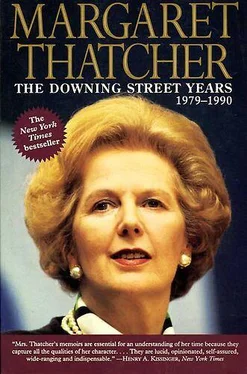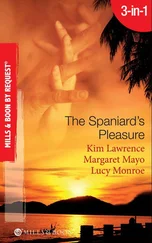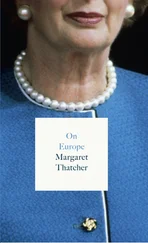After becoming leader in 1975, I had considered appointing Keith Joseph as Shadow Chancellor. Keith had done more than anyone else to spell out in his speeches and pamphlets what had gone wrong with Britain’s economic performance and how it could be transformed. He has one of the best minds in politics. He is an original thinker, the sort of man who makes you understand what Burke meant when he wrote of politics being ‘philosophy in action’. He is rare in another way too: he combines humility, open-mindedness and unshakeable principle. He is deeply and genuinely sensitive to people’s misfortunes. Although he had no doubt of the Tightness of the decisions which we were to make, he knew that they meant unviable firms would collapse and overmanning become unemployment, and he cared about those who were affected — far more than did all our professionally compassionate critics. But such a combination of personal qualities may create difficulties in the cruel hurly-burly of political life which Chancellors above all must endure. So Keith took over at Industry, where he did the vital job that no one else could have done of altering the whole philosophy which had previously dominated the department. Keith was — and remains — my closest political friend.
John Biffen I appointed Chief Secretary to the Treasury. He had been a brilliant exponent in Opposition of the economic policies in which I believed and, before that, a courageous critic of the Heath Government’s U-turn. But he proved rather less effective than I had hoped in the gruelling task of trying to control public expenditure. His later performance as Leader of the House where the qualities required were acute political sensitivity, good humour and a certain style was far happier. John Nott became Secretary of State for Trade. He, too, had a clear understanding of and commitment to our policies of monetary control, low taxes and free enterprise. But John is a mixture of gold, dross and mercury. No one was better at analysing a situation and prescribing a policy to deal with it. But he found it hard, or perhaps boring, to stick with the policy once it had been firmly decided. His vice was second thoughts.
With Geoffrey and Keith helping me to give a lead to the Cabinet, however, and with the loyalty I knew I could rely upon from Willie and some of the others, I believed we could see the economic strategy through.
Otherwise, it seemed prudent in the light of our effective performance in Opposition and the election campaign to maintain a high degree of continuity between Shadow Cabinet and Cabinet posts. Willie Whitelaw became Home Secretary, and in that capacity and later as Leader of the Lords he provided me personally and the Government as a whole with shrewd advice based on massive experience. People were often surprised that the two of us worked so well together, given our rivalry for the leadership and our different outlook on economics. But Willie is a big man in character as well as physically. He wanted the success of the Government which from the first he accepted would be guided by my general philosophy. Once he had pledged his loyalty, he never withdrew it. He supported me steadfastly when I was right and, more important, when I wasn’t. He was an irreplaceable deputy prime minister — an office which has no constitutional existence but is a clear sign of political precedence — and the ballast that helped keep the Government on course.
But I felt that some changes in portfolios were required. I brought in the formidable Christopher Soames to be Leader of the House of Lords. Christopher was his own man, indeed excessively so, and thus better suited to solo performances — whether as Ambassador in Paris or the last Governor of Rhodesia — than to working in harmony with others. Peter Carrington, who had led the Lords skilfully in Opposition, became Foreign Secretary. His unrivalled experience of foreign affairs more than qualified him for the job. Peter had great panache and the ability to identify immediately the main points in any argument; and he could express himself in pungent terms. We had disagreements, but there were never any hard feelings. We were an effective combination — not least because Peter could always tell some particularly intractable foreign minister that whatever he himself might feel about a particular proposition, there was no way in which his prime minister would accept it. This generally proved convincing. I was determined, however, that at least one Foreign Office minister should have a good grounding in — and sound views on — economic policy. I had Peter bring in Nick Ridley.
Two other appointments excited more comment. To his surprise, I asked Peter Walker to be Minister of Agriculture. Peter had never made a secret of his hostility to my economic strategy. But he was both tough and persuasive, priceless assets in dealing with the plain absurdities of the European Community’s Common Agricultural Policy. His membership of the Cabinet demonstrated that I was prepared to include every strand of Conservative opinion in the new Government, and his post that I was not prepared to put the central economic strategy at risk.
That was perhaps less clear in my decision to keep Jim Prior on at Employment. I shall describe elsewhere the divergences of opinion between Jim and the rest of us during Opposition. Running on from that time there was a lively argument about trade union reform. We all agreed that trade unions had acquired far too many powers and privileges. We also agreed that these must be dealt with one step at a time. But when it came down to specific measures, there was deep disagreement about how fast and how far to move. Yet there was no doubt in my mind that we needed Jim Prior. There was still the feeling in the country, and indeed in the Conservative Party, that Britain could not be governed without the tacit consent of the trades unions. It was to be some years before that changed. If we had signalled the wholesale reform of the unions over and against their opposition at the outset, it would have undermined confidence in the Government and perhaps even provoked a challenge we were not yet ready to face. Jim was the badge of our reasonableness. He had forged good relations with a number of trade union leaders whose practical value he perhaps overestimated. But he was an experienced politician and a strong personality — qualities he subsequently demonstrated to great effect in Northern Ireland.
The law prescribes that only twenty-two people may receive the salaries of Cabinet ministers. My decision to appoint a Foreign Secretary from the House of Lords meant that we had to have an additional Foreign minister in the Cabinet to answer in the Commons. Members of the House of Commons in any case dislike seeing too many Members of the Lords in the Cabinet. They accept, of course, that the Leader of the Lords and the Lord Chancellor (in this case the distinguished and effervescent Quintin Hailsham) and possibly a third peer of obvious suitability must be in the Cabinet. But they demand that there must be a second Cabinet minister in the Commons to answer for any departmental head who is a peer. In this post I appointed Ian Gilmour. (A similar arrangement would later be necessary when David Young joined the Cabinet, first at Employment and then at Trade and Industry.) Ian remained at the Foreign Office for two years. Subsequently, he was to show me the same loyalty from the back-benches as he had in government.
I was anxious to have Angus Maude in the Cabinet to benefit from his years of political experience, his sound views, and his acid wit. He would handle government information. At the end of the day, we were short of one place. As a result, Norman Fowler, as Minister of State at Transport, was not able to be an official member of the Cabinet, although he attended all our meetings.
Читать дальше












